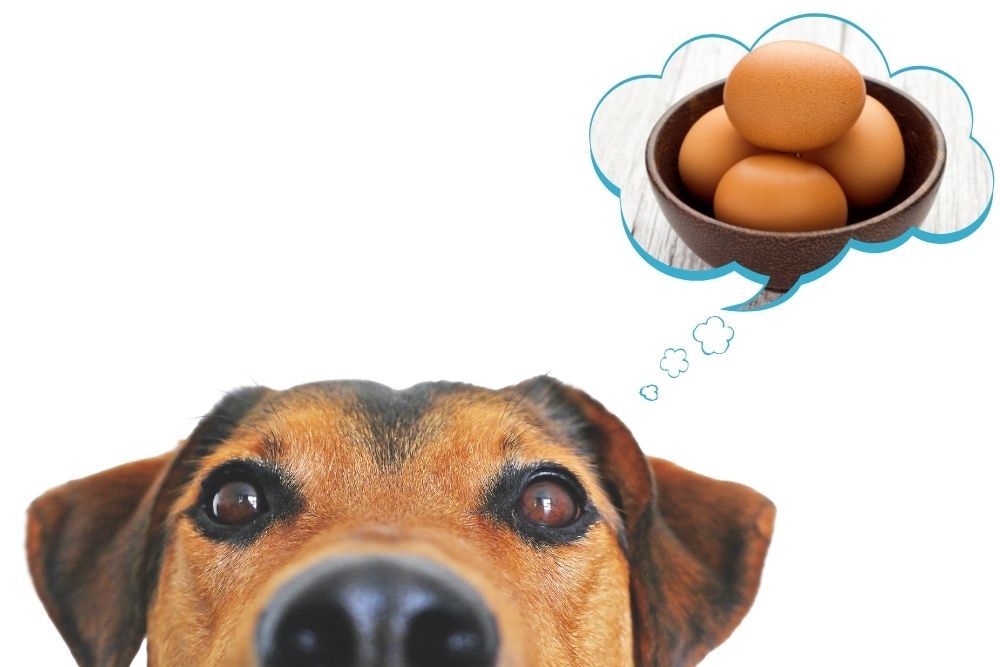Eggs are safe for dogs. They are good for them as well because a single egg is loaded with an amazing number of health benefits. Eggs are rich in protein, vitamin, and fatty acid content – all of the things that dogs need.
Eggs are one of the most economical and nutritious foods for humans and a superfood for dogs. Our canine companies badly need many minerals and other components that eggs provide.
If your dog has eaten eggs and he is acting abnormally or suffering allergy-like symptoms, be sure to consult with your veterinarian.
Nutritional Benefits of Eggs for Dogs
A single medium raw egg contains 4.2 g total fat, 6 g protein, and 63 calories. It also contains 163 mg cholesterol, 62 mg sodium, 60 mg potassium, and 0.3 g carbs. Eggs also contain iron, vitamin B6, vitamin D, magnesium, and calcium, among other things.
All these vitamins, calories, fatty acids, minerals, and so on are packed within one 44 g medium raw egg. An egg is nothing short of a powerhouse.
Here are the various components of an egg and how they help your dog:
-
1
Protein – The most important of the lot, protein helps build muscles, skin, nails, tendons, ligaments, and cartilages in dogs, among other things.
-
2
Amino Acids – Amino acids specifically (in proteins) provide energy much like carbs do and keep the dog’s immune system strong
-
3
Fatty acids – Components of fatty acids aid in brain and eye development in puppies, improve cognitive function in adult and senior dogs, and also help in treating canine arthritis as well as chronic kidney disease.
-
4
Vitamin A – Supports healthy eyes, healthy skin, organ formation, immune function, and bone structure.
-
5
Vitamin B12/cobalamin – Promotes a healthy nervous system and brain functions, and helps in the formation and growth of healthy blood cells.
-
6
Vitamin B19/Folate – Folate aids in optimal cell growth during infancy, adolescence, and pregnancy while controlling blood levels of homocysteine.
-
7
Iron – Vital for the production of oxygen-carrying hemoglobin as well as required for various enzymes for healthy body functions.
-
8
Selenium – Bolsters the immune system and thyroid gland in tandem with other trace minerals.
-
9
Riboflavin – Critical for healthy digestion as riboflavin is responsible for breaking down fat, carbs, and proteins to turn them into energy required for the canine’s cells. It also aids in the repair and growth of DNA.
-
10
Phosphorus – Phosphorus (with calcium) maintains bone and teeth integrity. Dog bones and teeth have 86% of the total body phosphorus.
-
11
Calcium – Critical for growth, healthy bones, teeth maintenance, muscle building, optimal heart function, as well as a healthy nervous system.
-
12
Potassium – This electrolyte improves the electrical charges and how they function in the nerves, across muscles, and in the heart. Helps provide energy to the canine’s body.
-
13
Sodium – Sodium is a major component of salt. Sodium is important to maintain fluid balance, nerve signal transmissions, and the balance between bodily acids and bases.
-
14
Copper – Copper is also critical for bone growth and is also used in the formation of collagen, connective tissues, and the protective coverings of nerves (known as myelin). Copper is also important to absorb the iron in the body so that the mineral can do its job.
-
15
Magnesium – Involved in energy production at the very cellular level. Energy transfer and consequently, even the slightest basic processes of the body such as moving a muscle or having a reaction, would be impossible without magnesium.
-
16
Manganese – Dogs require manganese to produce energy, metabolize carbs and proteins, and make fatty acids. This mineral is also used by different enzymes and aids in the maintenance and repair of bone and cartilage of joints.
-
17
Zinc – Wound healing and fighting diseases aside, zinc also aids hormones like insulin, thymus hormones, and growth hormones.
The deficiency of anything here can be fatal, as you can see. For example, low potassium levels can make the dog weak, lethargic, inactive, and lazy. Low copper can make iron absorption worsen which, in turn, will lead to a ton of problems. And so on.
Portions of smaller eggs are good for pups. The majority of an egg’s iron and zinc supply lies with the egg yolk. Not all pups are built for such a heavy intake of these minerals. Consult your vet to figure out the ideal daily egg consumption for puppies.
Can Dogs Eat Eggs?

Yes. Dogs can eat eggs as long as you keep the consumption in check. There are specific limits that you should adhere to (more on that later).
Apart from biotin deficiency if consumed in large amounts, eggs don’t generally cause any other complications in dogs. Still, if your dog has an underlying medical condition, is very young, is very old, or is on medication, it makes sense to first check with your vet and determine the safety of eating eggs in its case.
Potential Dangers Of Feeding Eggs To Dogs
Here are a couple of problems you should be aware of.
Biotin Deficiency
Biotin (in raw egg yolk) is a vitamin that promotes healthier skin, better digestion, a more efficient metabolism, as well as healthier cells. Biotin deficiency is rare in dogs and can be brought upon by over-consumption of eggs. Egg whites contain an enzyme called avidin. Avidin prevents the absorption of biotin in the body. Biotin deficiency can bring a host of problems with it.
This is a known fact and many think that eggs can easily cause biotin deficiency in dogs. Though it is true, the less advertised fact is that the egg yolks contain huge amounts of biotin itself, and as long as your dog is taking both together, biotin levels are more or less balanced out.
In any case, as long as you keep your dog’s egg consumption in check, you are in the clear. In fact it would take more than two dozen egg whites consumed daily over the course of many months to cause a deficiency, making this an unlikely occurrence.
There are plenty of health benefits of eggs. It is highly recommended that you try adding eggs to your dog’s daily diet.
Salmonella bacteria
According to the Centers for Disease Control and Prevention, Salmonella makes people and dogs sick. Salmonella is a type of bacteria sometimes present in live poultry including chicken. When laying eggs or through droppings, these bacteria can get transferred on eggshells. As long as the shells are washed properly by the store and you, there is no risk.
Sometimes, the bacteria can also be present inside the eggshell, having developed attacking the egg’s content while it’s still forming inside the contaminated hen. A lot less egg-laying hens today have the Salmonella bacteria but it’s better to prevent it than to take any chances.
If you are cooking an egg then there is no problem. Cooking or boiling any egg up to 160F will get rid of any bacteria and germs. If you plan to use the egg raw, then make sure it is refrigerated at 40F or lower first. Both cold and heat can kill any bacteria.
Even if the germs make it to your dog’s digestive tract, it is much less likely to harm it than a human because the dog’s digestive system is highly acidic and their bile can easily kill much of harmful germs and bacteria – an evolutionary advantage they have thanks to their role as scavenging carnivores.
Are Raw Eggs Good for Dogs?

This has been a hot debate among dog owners and enthusiasts. The benefits and safety of raw eggs are often questioned. As a general rule of thumb, too much of anything can be bad.
Can dogs eat raw eggs? They absolutely can. As long as raw eggs:
Dogs can eat them.
A cracked raw egg over food is a highly nutritional topping. Don’t overfeed eggs. An egg a day for up to 4-5 times a week (more on frequency later) is sufficient for larger dogs. Smaller dogs need half an egg. Puppies should avoid eggs.
Do not stick to yolks only as they will overload your dog with biotin. If you only feed egg whites, you will instead be overloading them with avidin, leading to biotin deficiency.
Can Dogs Eat Eggshells?

Technically there is no problem, but you should always consult a vet first. The calcium from eggshells are great for your dog’s teeth and bones, but as long as you have other sources of calcium, it doesn’t really matter. Eggshells also have sharp edges when broken plus they are not tasty.
With that said, many pet owners would grind them to a fine powder for easier absorption of protein and calcium.
Some sources however recommend it, actually, because of the calcium, amino acids and other minerals. In one study, 51 dogs with joint issues received eggshells once daily for 6 weeks. At the end of the trial period, the dogs had significant reduced joint pain and improved joint function.
To feed eggshells safely to your dog, it’s recommended to rinse them really well or boil the eggs first to kill off any salmonella. Then, add a ½ teaspoon of crushed eggshells as a topper to their dry food, on occasions.
How Many Eggs Can a Dog Eat?
Half an egg per day for smaller dogs and a single egg a day for larger dogs is the usual recommendation. Generally, puppies are only recommended to be allowed to “taste” eggs and not eat a significant chunk.
Giving an egg every day is also not recommended. You should limit your dog’s egg intake to 4-5 per week. This will help prevent biotin deficiency.
Even 4-5 eggs per week are only recommended when paired with a high-quality source of natural animal-based protein. If your dog is not on a meat-based diet then refrain from feeding it more than 2 eggs a week.
Eggs for Dogs FAQs
Here are answers to some common questions.
Do eggs give dogs diarrhea?
No. When consumed within limits, eggs create no problems in dogs. However, if a dog eats an egg contaminated by salmonella bacteria, they run the risk of contracting Salmonellosis, a bacterial infection and symptoms include fever, vomiting, diarrhea, and lethargy.
Can eggs cause allergies in dogs?
Yes. Egg are high on the list of likely food allergens for dogs. If your dog is experiencing allergy-like symptoms, stop feeding him the eggs and see if the problem has been eliminated.
Can dogs eat scrambled eggs?
Dogs can technically eat scrambled eggs but boiled and raw eggs are better. Fried eggs have to be avoided completely.
Can dogs eat hard boiled eggs?
Yes.
Can puppies eat raw eggs?
Yes, but very little amounts. Generally recommended to avoid.
Butter or oil for eggs?
Avoid oil. Butter is also not recommended. Sprinkle some cheese for a treat.
Can dogs eat omelets?
No. Oil, onions, salt, etc. should be avoided.
Can dogs eat poached eggs?
Yes.
So, Are Eggs Safe for Dogs?
Yes, you can definitely feed eggs to your Fido! Eggs are good treats for dogs and a good source of essential amino acids, the building blocks of our body. Although eggs do cause harm when given in excess, providing them in moderation to your dog has many nutritional benefits. If in doubt, always seek the help of a vet to know how often to feed them to your pup.
Other great reads you’ll love:
Medical Disclaimer: If you are concerned about your pet, visit or call your veterinarian – he/she is your best resource to ensure the health and well-being of your dog. This information is for informational purposes only and is not intended to help assess or manage animal exposures or as a substitute for the professional advice of, or diagnosis or treatment by, your veterinarian with respect to your pet.


